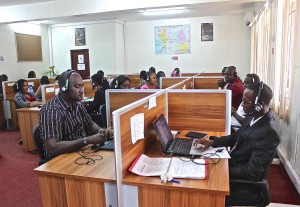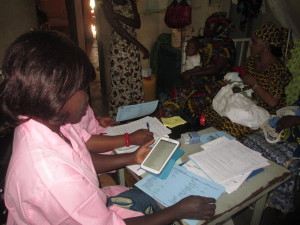Before designing an SBCC strategy, program managers conduct a situation analysis that includes formative research on knowledge, attitudes, norms, beliefs and practices in communities. In the urgency of an Ebola outbreak, the addition of rapid assessments can provide quick snapshots of situations on the ground to help localize and tailor SBCC initiatives and deepen community engagement.
For example, rapid assessments can provide information on the latest rumors or trusted sources of information in a community, so that program managers can plan their SBCC activities accordingly. Keep in mind, however, that these rapid assessments are meant to complement, not substitute for, more detailed and thorough data collection analysis and may even inform program design and implementation.
When proper methods are used, results can be reliable and valid, but it is important to note that even though these may be “rapid assessments,” the data must be robust enough to be useful. It should not be so rapid that the data cannot form a reliable assessment. Further, pay attention to the ethical review processes for interviewing community members prior to conducting rapid assessments.
Several rapid assessment methodologies are described below.
Field-based Data Collectors
One way to conduct rapid assessments is to hire trained personnel who collect data through key informant interviews or focus group discussions. Results may alert programs to important emerging issues. For instance, prior to engaging in a vaccine trial in a community, the team needs to survey community members to gauge their perceptions of vaccines, conducting trials and related issues. Data collectors can record answers using a mobile phone data collection service or paper-based reports, results of which can be analyzed and disseminated through a central coordinating mechanism at the national and local levels.
During the 2014–15 outbreak, for example, a UNICEF initiative involved monitors who observed and reported back on community perceptions and social mobilization initiatives through a mobile phone survey system called RapidPro. In this way, monitors reported on both program effectiveness—such as the number of house-to-house visits social mobilizers made in a particular geographic area—as well as communication issues that would inform programs, such as whether they heard about resistance to safe burials in the community or exhumation of bodies.
Using SMS Surveys
Rapid assessments can also be conducted via SMS, where individual mobile phone users are asked to answer questions directly from their phones, rather than through data collectors in the field. Through existing relationships with mobile network operators, programs using a mobile surveying service can rapidly and remotely collect key data. For example, the Health Communication Capacity Collaborative (HC3) based at Johns Hopkins Center for Communication Programs used a platform called GeoPoll to collect data in Liberia, which was successful in getting thousands of responses within days. Customized SMS-based surveys can gather data from remote villages and traditionally hard-to-reach places as they only need mobile phone users (without data plans or internet access).
SMS Surveys - Sample Questions
Generally, SMS surveys should ask no more than 10 questions (5 or 6 per survey are ideal). These should be written in the region’s local languages and allow people to select answers using numbers on a mobile phone keypad. Below are sample questions used in HC3’s SMS survey to quickly understand trusted sources and issues related to self-efficacy and stigma:
Whom do you trust to talk about Ebola?
Where do you trust information about Ebola to come from?
How is Ebola spread?
How likely are you to be infected?
How confident are you that you can protect yourself from Ebola?
What should you do if you have a fever or headache?
Can people recover from Ebola?
Do you know anyone who has recovered from Ebola?
How likely will you be to welcome someone back who has recovered from Ebola?
What information do you want to have about Ebola?


